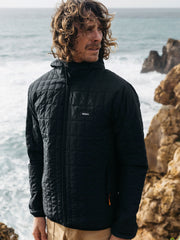Cornwall Seal Group Research Trust
09.26.20
4 min read
Written by Rick Evans & Sue Sayer
Images by CSGRT
We are lucky to share our seas in the southwest of England with a globally rare marine mammal – the grey seal. The UK has a third of the world’s population of these iconic and charismatic creatures. Although, they are still outnumbered by red squirrels!
One thing we share with grey seals is a need for both land and sea. We depend on the sea for every second breath from oxygen made by phytoplankton. Seals need land for key parts of their lives. Here they pup, rest, digest and restore emergency oxygen supplies after deep 120m dives.
Regular sea users will be well aware of seals. These dog-like mammals sleep on rocky outcrops, bob about at the surface, follow kayaks or explore fins with sensitive muzzles and cat-like whiskers. Summer is a critical time for seals, the season when they feed up ready for the challenges of the breeding season.
Most males are non-breeding. Only a few of them have the ‘X factor’ needed to be a dominant male. ‘Beachmasters’ protect their chosen females and father the next generation of seal pups. They are not the biggest or strongest males but the most adaptable to the rapid changes taking place around our coast. They are the smartest leaders demonstrating patience, empathy and respect. Beachmasters must build up their energy reserves to get ready for the pupping season (August to December). They cannot afford to leave their chosen females to feed, sometimes for months.
Seal mums top seal society, ruling even powerful Beachmasters. They can reject any amorous advances until they are ready to mate. This happens three weeks after giving birth when they wean their pups. In three short weeks, amazing fast food transfer takes place. Pups grow from 10kg skin and bone, newborn pups into 40kg ‘barrels’. By this time, they have lost their long white fur replaced with a patterned grey coat.
Life at sea is tough for grey seals with mortality as high as 75% in the first 18 months. This is why summertime is critical. Adult seals must build up their fat reserves. A beachmaster may lose his dominance, territory and females. Mums who pass a third of their body weight onto their pups may themselves starve. Even slightly underweight pups will not survive their first few months. This is because they do not have enough energy stores to survive the time it takes to teach themselves to feed. So, if you see a resting seal, please give it an extra wide berth. The consequences of changing its behaviour can have serious consequences for the seal and its offspring.
Seals link the ocean to the land. They bring an early warning of invisible changes taking place at sea. As top predators, seals keep the marine ecosystem in balance and are a global tourist attraction increasing prosperity by diversifying coastal economies.
So, we need seals to thrive, but seals need us too. The grey patterned coat of a moulted seal pup is unique, like our fingerprint. It is a marker for each individual seal for life. Over 20 years, Cornwall Seal Group Research Trust (CSGRT) has built up a network of hundreds of volunteers in 25+ community hubs around the southwest. These volunteers can recognise the fur patterns of seals on their patch. CSGRT’s network has shown that seals from Devon, Cornwall, Somerset and Dorset move across national borders. Seals from the southwest have swum to the Isle of Man, Wales, Ireland, France, Belgium and Holland. No-one knew southwestern seals were so well travelled! In 20 years, CSGRT have done 35,000+ surveys, processed more than one million photos resulting in 72,000+ seal identifications. They have built up individual seal life histories. Seals they first met in 2000 have been re-identified in 2020. CSGRT evidence is shared globally to shape planning, policy and legislation to protect our oceans for seals and people.
Every seal counts, but so does every person. Last year at more than 159 events, CSGRT’s marine rangers connected with over 12,000 people visiting an amazing pop-up mobile marine centre exhibition. CSGRT want to inspire everyone with ocean optimist messages. Rangers share ideas about the daily actions we can all take at home, work and play to make the oceans cleaner and healthier. CSGRT must keep this momentum going to give seals a voice, so we can share our seas successfully. This is why CSGRT need help from you.
In a normal year, CSGRT would have the funds needed for their marine conservation ranger team. They coordinate and lead the volunteer network and run public events. This year COVID cancelled all events that drive grants and donations. This means CSGRT has a £50,000 shortfall, so they launched a successful Crowdfunder appeal to raise £20,000.
You can still donate to the Crowdfunder stretch target or volunteer to help the team. Find out more about the work of the CSGRT and how you can get involved here.
















































































